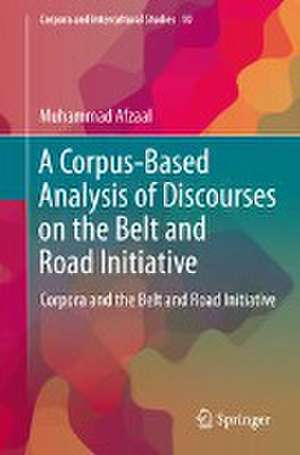A Corpus-Based Analysis of Discourses on the Belt and Road Initiative: Corpora and the Belt and Road Initiative: Corpora and Intercultural Studies, cartea 10
Autor Muhammad Afzaalen Limba Engleză Paperback – 21 ian 2023
This book adopts a corpus-based critical discourse analysis approach and examines a corpus of newspaper articles from Pakistani and Indian publications to gain comparative insights into the ideological construction of China’s Belt and Road Initiative (BRI) and the China-Pakistan Economic Corridor (CPEC) within news discourses. This book contributes to the works on perceptions of BRI in English newspapers of India and Pakistan. A multi-billion-dollar project of BRI or the "One Belt One Road” (OBOR), CPEC symbolizes a vision for regional revival under China's economic leadership and clout. Propelled by the Chinese Premier’s dream to revive the Chinese economy as well as to restructure and catalyze infrastructural development in Asia, BRI is aimed at connecting Asia via land and sea routes with Europe, Africa, and the Middle Eastern states.
Preț: 719.76 lei
Preț vechi: 877.76 lei
-18% Nou
Puncte Express: 1080
Preț estimativ în valută:
137.74€ • 149.57$ • 115.70£
137.74€ • 149.57$ • 115.70£
Carte tipărită la comandă
Livrare economică 22 aprilie-06 mai
Preluare comenzi: 021 569.72.76
Specificații
ISBN-13: 9789811996184
ISBN-10: 9811996180
Pagini: 130
Ilustrații: XVII, 130 p. 21 illus., 15 illus. in color.
Dimensiuni: 155 x 235 mm
Greutate: 0.22 kg
Ediția:1st ed. 2023
Editura: Springer Nature Singapore
Colecția Springer
Seria Corpora and Intercultural Studies
Locul publicării:Singapore, Singapore
ISBN-10: 9811996180
Pagini: 130
Ilustrații: XVII, 130 p. 21 illus., 15 illus. in color.
Dimensiuni: 155 x 235 mm
Greutate: 0.22 kg
Ediția:1st ed. 2023
Editura: Springer Nature Singapore
Colecția Springer
Seria Corpora and Intercultural Studies
Locul publicării:Singapore, Singapore
Cuprins
Introduction.- Review of Literature.- Chapter 3 Theoretical Framework and Methodology.- Perceptions of China Pakistan Economic Corridor and Belt and Road Initiative.- Perception of BRI and CPEC in Indian Newspapers.- Discussions: Similarities and Differences of BRI and CPEC in Media Discourses of India and Pakistan.- Conclusion.
Notă biografică
Dr. Muhammad Afzaal joined the Institute of Corpus Studies and Applications, Shanghai International Studies University, China as an associate professor after gaining his Ph.D. at the Shanghai Jiao Tong University, China, and completing an extended research fellowship at the Hong Kong Polytechnic University, Hong Kong. His work experience also includes seven years of teaching at Foundation University Islamabad, Pakistan. His Ph.D. research comprised a corpus-based analysis of discourses on the Belt and Road Initiative. Afzaal’s research interests include topics in the areas of corpus linguistics, discourse analysis, critical discourse analysis, translation studies, and the integration of language sciences with NLP and big data. He is the guest editor of his two special issues of SSCI-indexed journals such as Frontiers in Psychology, Frontiers in Bid Data, and Frontiers in Artificial Intelligence. He has published extensively in SSCI, Scopus and ESCI Indexed International journals such as Critical Discourse Studies, Corpora, International Journal of Applied Linguistics, Discourse Studies, Asia Pacific Business Review, Critical Arts, Chinese Journal of Communication, Asian Journal of Communications, Frontiers in Psychology, Australian Review of Applied Linguistics and Asian Journal of Comparative Politics.
Textul de pe ultima copertă
This book adopts a corpus-based critical discourse analysis approach and examines a corpus of newspaper articles from Pakistani and Indian publications to gain comparative insights into the ideological construction of China’s Belt and Road Initiative (BRI) and the China-Pakistan Economic Corridor (CPEC) within news discourses. This book contributes to the works on perceptions of BRI in English newspapers of India and Pakistan. A multi-billion-dollar project of BRI or the "One Belt One Road” (OBOR), CPEC symbolizes a vision for regional revival under China's economic leadership and clout. Propelled by the Chinese Premier’s dream to revive the Chinese economy as well as to restructure and catalyze infrastructural development in Asia, BRI is aimed at connecting Asia via land and sea routes with Europe, Africa, and the Middle Eastern states.
Caracteristici
Provides empirical insights into the perceptions of CPEC and BRI prevalent in India and Pakistan's media discourses Identifies new directions for researchers of CDA, PDA and CL to probe political discourses related to CPEC and BRI Adopts corpus-based CDA to analyze the socio-political aspects of the BRI image constructed in English newspapers









